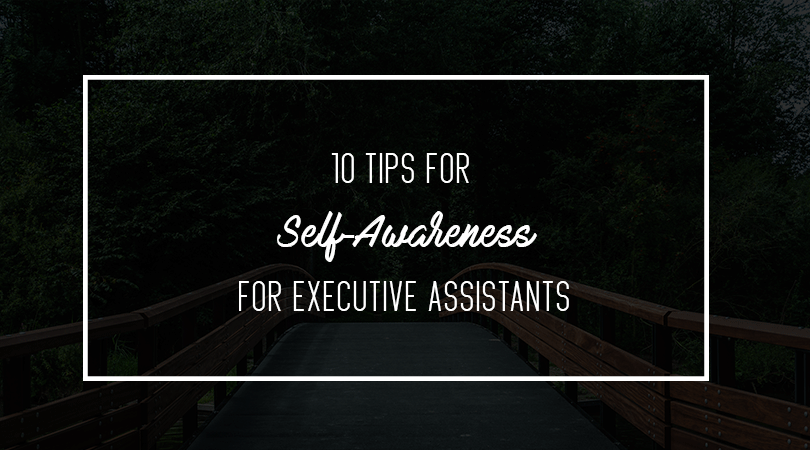10 Tips for Self Awareness for Executive Assistants
We’ve all had an encounter (either in the workplace or outside) with someone who isn’t self-aware. Perhaps it was the person screaming at the executive assistant at work for no apparent reason.
“I wonder what that person’s problem is.” You think to yourself as you shake your head and stare.
Or perhaps, it’s the encounter with the person who cuts in front of you while you’re driving on the freeway. Everyone is heading somewhere, why is that one person under the impression that what they are headed to is more important than everyone else’s plans?
The problem, at the very core, is that both people in both of those scenarios are not self-aware. They have no ability to understand how their actions affect those around them.
Imagine if they were able to understand how others perceive them in those moments, would they act differently?
Self-awareness is important but often forgotten. As an executive assistant, understanding how your actions can influence and affect others can be an important part of your job.
If you practice self-awareness, you can learn not only how to strengthen your work relationships but also understand what incentivizes you, so you can make the most out of your role and help your executive succeed.
We wrote this article to help you better understand the importance of self-awareness, how self-awareness is the cornerstone for emotional intelligence, and ways you can practice self-awareness today.
We’re aware (self-aware wink, wink) of your busy schedule and don’t want to waste any more time, so let’s jump in!
What is the importance of self-awareness?
Psychology Today has a great explanation of self-awareness and why it’s important.
We broke it down for you.
In a nutshell, self-awareness can be described as “the awareness of the self, with the self-being what makes one’s identity unique. These unique components include thoughts, experiences, and abilities.”
Basically, when we focus our attention internally, we compare our behavior to our internal standards and can objectively evaluate ourselves. We can learn to understand why we react to certain things in a certain way.
To focus your attention internally, note the next time you find yourself frustrated at someone or something. Take a moment to stop and reflect. Why are you frustrated, truly? Is it the current situation or something deep-seated? Perhaps you aren’t frustrated at the situation, but at something that happened a while ago and has just been compounding. Try to let your mind wander while you think through different possibilities. What comes up might surprise you.
Famed psychologist Daniel Goleman wrote about self-awareness in his best-selling book Emotional Intelligence as “knowing one’s internal states, preference, resources, and intuitions.”
Self-awareness is a cornerstone for emotional intelligence, and if you have high emotional intelligence (especially emotional intelligence as an executive assistant), you will be able to understand and process your emotions and the emotions of those around you, which in turn helps you succeed.
Self-awareness allows you to better understand and navigate the work around you. As a self-aware executive assistant, you will be able to understand and empathize with people you have to interact with, which allows you the chance to quickly connect with them and build a relationship, and more effectively communicate, problem-solve and collaborate.
Self-awareness is powerful, but it is just a puzzle piece in the grand idea of emotional intelligence.
How does self-awareness play into emotional intelligence?
In his book, Goleman identified five domains associated with emotional intelligence: self-awareness, self-regulation, motivation, empathy and social skills. Let’s look at each one in more detail:
- Self-Awareness: As we said earlier, if you are self-aware, you understand how and why you feel a certain way. Self-awareness also allows you to know how your emotions and actions affect the people around you. Next time you’re leading a meeting, try noticing how your energy affects those around you. Try going into a meeting with a smile and then try walking in with more solemn energy, and pay attention to how the room shifts based on your energy. Read on to learn tips on boosting self-awareness as an executive assistant.
- Self-Regulation: Self-regulation builds upon self-awareness. Self-regulation is all about staying in control of your emotions while being able to adapt to different situations. Without being self-aware, you won’t be able to predict how you will react and adapt to specific situations. Perhaps your executive’s flight was canceled last minute and you have to figure out how to get your executive to their final destination. Some people may react in a negative manner and spend time worrying about the issue instead of focusing on a solution. If you are self-aware, you have the ability to self-regulate and come up with solutions quickly and calmly.
- Motivation: If you are self-aware, you can use that to discover what truly motivates you. You can make sure that all of your professional goals are in line with your work, which makes it easier to commit and achieve something you really want. If you aren’t self-aware, you won’t be able to learn what drives you and you won’t be able to set goals effectively. When you understand what motivates you, you have the ability to use that motivation every day at your job. If you know where you want to end up, you can use every day and every opportunity to get there. Without motivation, a role becomes ”just a job” and performance could suffer.
- Empathy: If you aren’t self-aware and can’t figure out how you feel, how are you going to be able to understand how others feel? When interacting with people, try to put yourself in their shoes. Where did they come from and how would their upbringing shape their opinions and reactions to certain events? Being self-aware gives you the opportunity to communicate with people in a way that they can understand. We all wish empathy was taught in school, but it isn’t. When you understand what experiences people bring to your conversation, you have the ability to communicate using their perspectives. Empathetic people are incredible communicators and as an executive assistant, being a strong communicator can be very beneficial.
- Social Skills: Social skills can be broken into three V’s: Vocal, visual and verbal. The goal is to make sure all three V’s are aligned anytime you are communicating. That means make sure that your vocal inflection matches your verbal cues and body language. If you are delivering bad news, make sure you’re not doing it with a smile and a pep in your step. If you are aware of how others view the situation, you will be able to cater your social skills to the specific environment.
As you can see, self-awareness is the cornerstone for emotional intelligence and emotional intelligence is vital to effective communication. If you can practice self-awareness as an executive assistant, you can become an incredible asset to your executive and organization.
In a job where you are busy just getting from day to day, how on earth are you supposed to take the time needed to reflect, organize your thoughts and then figure out how to seamlessly integrate your practice skills into your already jam-packed schedule?
Here are 10 tips for becoming more self-aware:
- Conduct a SWOT analysis on yourself: Spend some time identifying your strengths, weaknesses, opportunities and threats. Be as honest as possible.
- Take a personality test: If you type in personality tests on Google, you will find a multitude of different tests that will help you determine your personality and develop your self-awareness further. If you want an easy one, we recommend this one.
- Write a daily reflection: Spend some time every day in the morning or in the evening writing down your thoughts and feelings. Take time to recognize when you are experiencing stronger-than-usual emotions and try to find out why you’re feeling that way.
- Remember that you are in control: When you do find yourself experiencing strong emotions (as we all do), take a moment to take a deep breath, become self-aware of how you are feeling, and know that if you are upset, it is because you are choosing to be upset. You can always choose a different response!
- Identify your values: Take some time and list out what you believe. You need to understand what is important to you before you are faced with hard decisions.
- Take responsibility: You are in control of your life. You cannot blame others when things don’t go to plan. Admit your mistakes and understand that if you are the leader, miscommunications ultimately land on you.
- Create space: When you are in the moment, it’s hard to take time to reflect. Make sure to give yourself some space, peace and time to look back and connect with yourself.
- Try meditation: When practicing self-awareness, mindfulness is key. Practicing mindfulness can be hard, it takes practice and time. Start with trying to clear your mind for five minutes a day and see how that affects your self-awareness.
- Practice Active Listening: Listening and hearing are two completely different things. Hearing someone doesn’t always mean understanding them. Listening means you are present and not only focused on what they’re saying but how they’re saying it, what their body language is saying and what their emotions are saying.
- Be open to a different perspective: Asking what others think of us is nerve-wracking, but asking those that you trust to give you feedback helps you learn more about yourself and how others view you. Not all of the feedback you get will be beneficial. Some people will sugarcoat their answers and others will be too harsh, but listening and learning from people will help you refine your understanding of self-awareness and how others view you.
If you practice self-awareness as an executive assistant, you will be able to easily connect with others, which will allow you to work as efficiently as possible. If you have a moment after reading this article, we invite you to take two minutes and notice how you feel right now and why. Again, your answer may surprise you. Continue growing in your role, you’ve got this!



